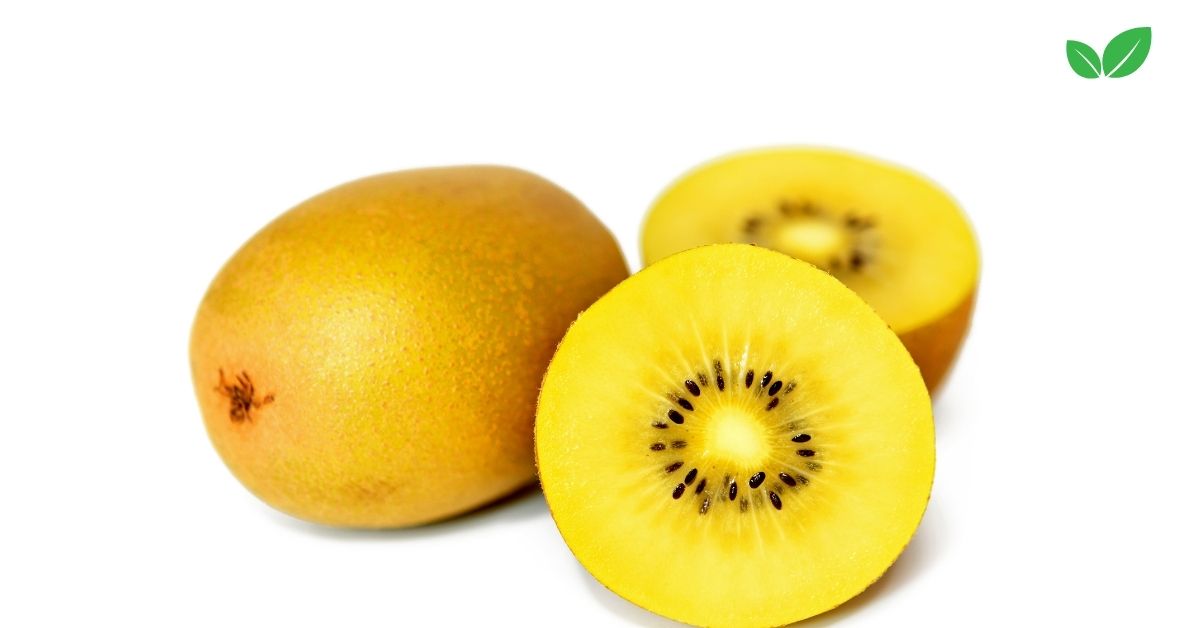Golden kiwi, scientifically known as Actinidia chinensis, is a tropical fruit that has gained global popularity for its sweet taste, vibrant yellow flesh, and numerous health benefits. Originating from China and now cultivated in various parts of the world, including New Zealand, Italy, and Chile, golden kiwi is renowned for its high vitamin C content, dietary fiber, and antioxidants. However, beyond its culinary appeal, the cultivation and production of golden kiwi have significant environmental implications. This article delves into the characteristics, ecological impact, sustainable farming practices, and global significance of golden kiwi, highlighting its role in promoting a more sustainable future for agriculture.
Characteristics of Golden Kiwi
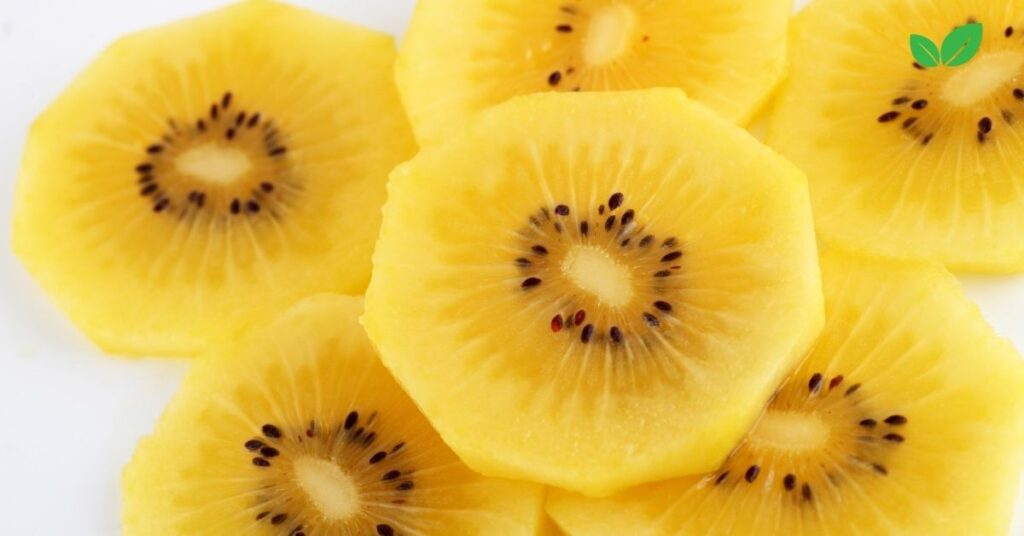
Morphological Features
Golden kiwi is a distinct variety of the kiwi fruit family, characterized by its smooth, bronze skin and vibrant golden flesh. Its unique appearance and sweet flavor set it apart from the more common green kiwi (Actinidia deliciosa).
- Size and Shape: Golden kiwis are typically smaller and more oval-shaped compared to green kiwis. Their smooth, hairless skin is a light brown or bronze color, making them easy to identify.
- Flesh Color: The flesh of golden kiwi ranges from deep yellow to a vibrant golden hue. It has a central core with small, edible black seeds evenly distributed throughout the fruit.
- Taste: Golden kiwis are known for their sweeter, less tangy taste compared to green kiwis, with a flavor profile that includes hints of tropical fruits like mango and melon.
- Nutritional Value: Golden kiwis are packed with essential vitamins and minerals. They are particularly high in vitamin C, vitamin K, potassium, and dietary fiber. The fruit also contains antioxidants, which contribute to its health benefits.
Growth and Cultivation
Golden kiwi plants are deciduous vines that belong to the family Actinidiaceae. They require specific conditions to thrive, making their cultivation a carefully managed process. The plants have certain growth requirements that must be met for optimal yield and fruit quality.
- Climate Requirements: Golden kiwis thrive in regions with temperate climates, where winters are cool but not harsh, and summers are warm and humid. This climate ensures that the plants undergo proper dormancy in winter and have enough warmth during the growing season.
- Soil Preferences: The vines prefer well-drained, fertile soils with a slightly acidic pH. They are sensitive to waterlogged conditions, which can lead to root rot and other fungal diseases. Therefore, proper irrigation and drainage are crucial for successful cultivation.
- Pollination: Golden kiwi plants are dioecious, meaning that male and female flowers grow on separate plants. For fruit production, both male and female plants must be grown together to ensure successful pollination. Bees are the primary pollinators, making them vital for the productivity of kiwi orchards.
Environmental Significance of Golden Kiwi Cultivation
Golden kiwi cultivation plays an important role in the agricultural landscape, contributing to local economies and offering sustainable farming opportunities. However, like all agricultural activities, it comes with environmental challenges that require careful management.
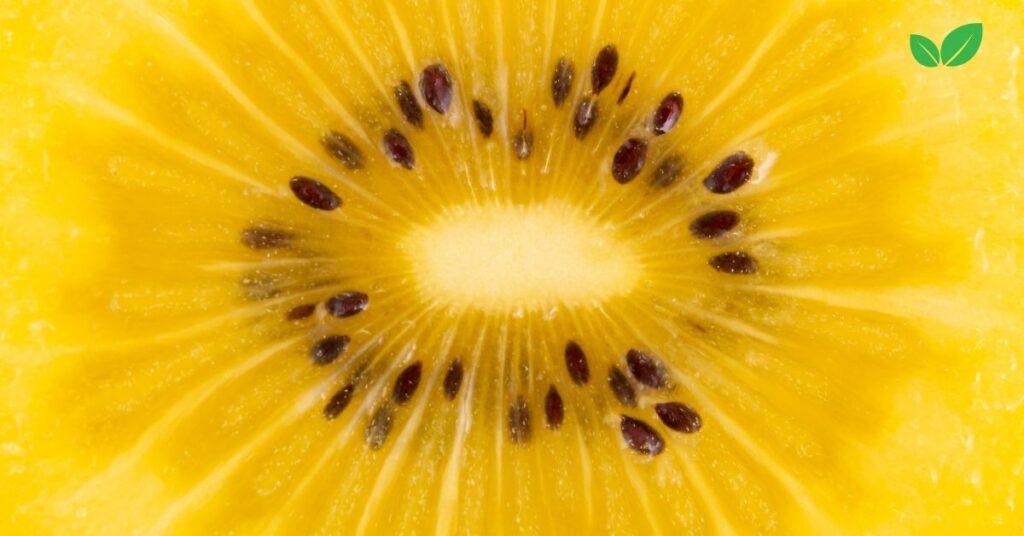
Contribution to Soil Health
Golden kiwi cultivation can have positive impacts on soil health when managed sustainably. The use of cover crops, organic fertilizers, and minimal tillage practices can improve soil structure and fertility.
- Organic Matter Addition: The practice of using organic mulch, compost, and cover crops in kiwi orchards helps maintain soil organic matter. This organic matter improves the soil’s water-holding capacity and provides nutrients essential for plant growth.
- Soil Erosion Control: The dense canopy of kiwi vines, along with well-maintained ground cover, helps reduce soil erosion by protecting the soil surface from direct rainfall. Reducing soil erosion is crucial for maintaining soil health and preventing sediment runoff into nearby water bodies.
Water Management and Conservation
Water management is a critical aspect of golden kiwi cultivation, especially since the plants require consistent moisture during the growing season. Sustainable water use practices help minimize the environmental impact of kiwi farming.
- Drip Irrigation: Drip irrigation is commonly used in golden kiwi orchards to ensure efficient water use. This method delivers water directly to the roots, minimizing evaporation and reducing water waste.
- Rainwater Harvesting: Some kiwi growers implement rainwater harvesting systems to capture and store rainwater, which can then be used for irrigation during dry periods. This reduces the demand for groundwater and supports sustainable water use.
- Impact of Over-Irrigation: Poor water management can lead to waterlogging, which not only affects plant health but can also result in nutrient leaching and soil degradation. Therefore, careful monitoring of soil moisture levels is essential for sustainable cultivation.
Role in Pollinator Support
Golden kiwi plants rely heavily on insect pollinators, especially bees, for fruit production. This relationship highlights the importance of maintaining healthy pollinator populations for successful cultivation.
- Bee Habitat: Kiwi orchards provide a habitat for pollinators during the flowering season. However, to support pollinators year-round, many farmers plant additional flowering species around the orchard, creating a more diverse and pollinator-friendly environment.
- Avoiding Pesticide Use: To protect pollinators, sustainable kiwi farming practices minimize or eliminate the use of harmful pesticides during flowering periods. Integrated Pest Management (IPM) strategies can help control pests without endangering beneficial insects like bees.
Carbon Sequestration and Climate Impact
Golden kiwi vines contribute to carbon sequestration by capturing carbon dioxide from the atmosphere during photosynthesis and storing it in plant biomass and the soil.
- Carbon Storage: The dense foliage and woody vines of golden kiwi plants can sequester carbon over time, contributing to a reduction in atmospheric carbon dioxide levels. This makes kiwi orchards valuable for carbon storage in agricultural landscapes.
- Impact of Greenhouse Gas Emissions: While kiwi farming can sequester carbon, the environmental impact of the industry can be offset by emissions from transportation, fertilizer use, and energy consumption during post-harvest processing. Adopting energy-efficient practices and reducing the use of synthetic fertilizers can help mitigate these impacts.
Sustainable Practices in Golden Kiwi Cultivation
To ensure the long-term viability of golden kiwi production, many farmers and agricultural organizations have adopted sustainable practices that balance productivity with environmental stewardship.
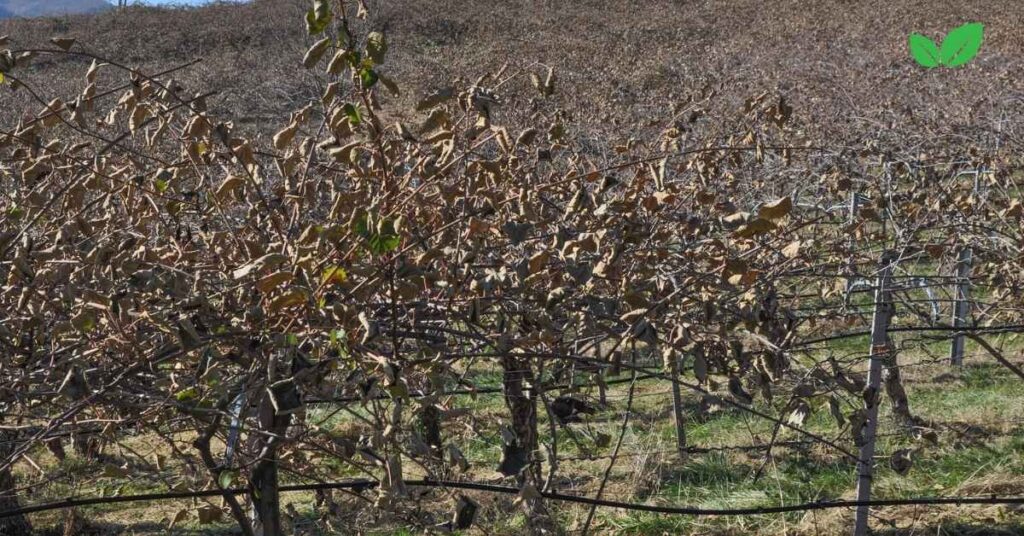
Organic Farming and Certification
Organic farming practices are gaining popularity among kiwi growers, as they align with consumer demand for sustainably produced fruits and support ecological health.
- Organic Fertilization: Using organic fertilizers, such as compost, manure, and biochar, enhances soil fertility without the negative environmental impact associated with synthetic fertilizers. Organic practices also promote the presence of beneficial soil microorganisms.
- Pest Management: Organic kiwi farming emphasizes the use of biological controls, such as natural predators and beneficial insects, to manage pests. Organic-approved insecticidal soaps and neem oil are also used as safer alternatives to synthetic pesticides.
- Certification Programs: Obtaining organic certification requires adherence to strict guidelines regarding pesticide use, soil management, and water conservation. This certification provides growers with access to niche markets and allows them to market their products as environmentally friendly.
Agroforestry and Diversification
Agroforestry and diversification strategies can enhance the resilience of kiwi orchards while providing additional benefits to the environment.
- Agroforestry Systems: Integrating kiwi vines with other tree crops, such as fruit trees or timber species, can create a more diverse ecosystem that is better equipped to withstand environmental changes. These mixed systems can provide shade, reduce wind erosion, and create habitats for wildlife.
- Crop Rotation and Diversification: Diversifying crops within and around kiwi orchards helps maintain soil fertility and reduces the risk of pest outbreaks. Intercropping with legumes, for example, can improve nitrogen levels in the soil, benefiting kiwi plants.
Water-Saving Technologies
Sustainable water management remains a priority for many golden kiwi producers, especially in regions where water availability is limited.
- Soil Moisture Sensors: Installing soil moisture sensors helps farmers monitor water levels and apply irrigation only when necessary. This technology ensures that water is used efficiently, reducing waste and conserving valuable resources.
- Mulching and Ground Cover: Applying organic mulch around kiwi vines helps retain soil moisture and reduces evaporation. Mulching also suppresses weeds, which can compete with the vines for water and nutrients.
Global Production and Economic Significance of Golden Kiwi
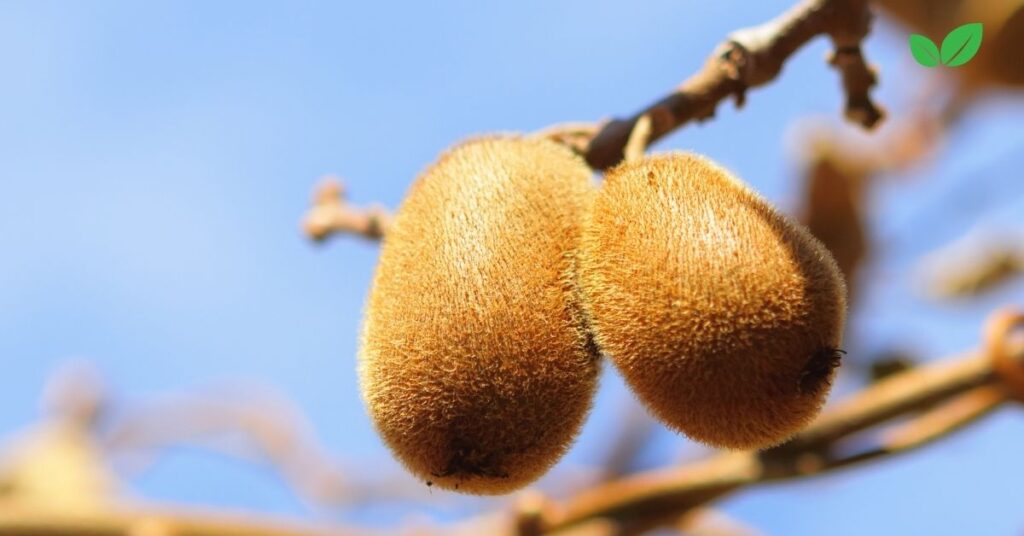
Major Growing Regions
Golden kiwi is now cultivated in several countries beyond its native China, with New Zealand being one of the largest producers and exporters. The global demand for this fruit has led to its cultivation in a variety of climates, each contributing to the overall supply.
- New Zealand: Known for its commitment to sustainable agriculture, New Zealand is a major producer of golden kiwi. The country’s clean environment and innovative farming practices have positioned it as a leader in the global market.
- Italy: As the leading producer of kiwis in Europe, Italy has expanded its production to include golden kiwi varieties. Italian growers focus on high-quality fruit and have adopted organic and sustainable practices to meet European consumer demand.
- Chile: Chile’s temperate climate allows for the successful cultivation of golden kiwi, particularly in the regions of Maule and O’Higgins. Chile has become a significant exporter of golden kiwi, supplying markets in North America and Asia.
Economic Benefits
The cultivation of golden kiwi has economic significance for many regions, providing employment opportunities, supporting local economies, and contributing to rural development.
- Export Revenue: Golden kiwi is a valuable export product, with countries like New Zealand and Italy benefiting from strong demand in international markets. Exporting this high-value crop supports trade balance and generates income for farmers.
- Job Creation: The kiwi industry creates jobs in farming, packaging, transportation, and distribution, contributing to the livelihoods of rural communities. During harvest season, many farms require additional labor, providing seasonal employment opportunities.
- Rural Development: In regions where golden kiwi is grown, the industry supports infrastructure development, including improved roads, water management systems, and processing facilities, which benefit the broader community.
Challenges in Golden Kiwi Production
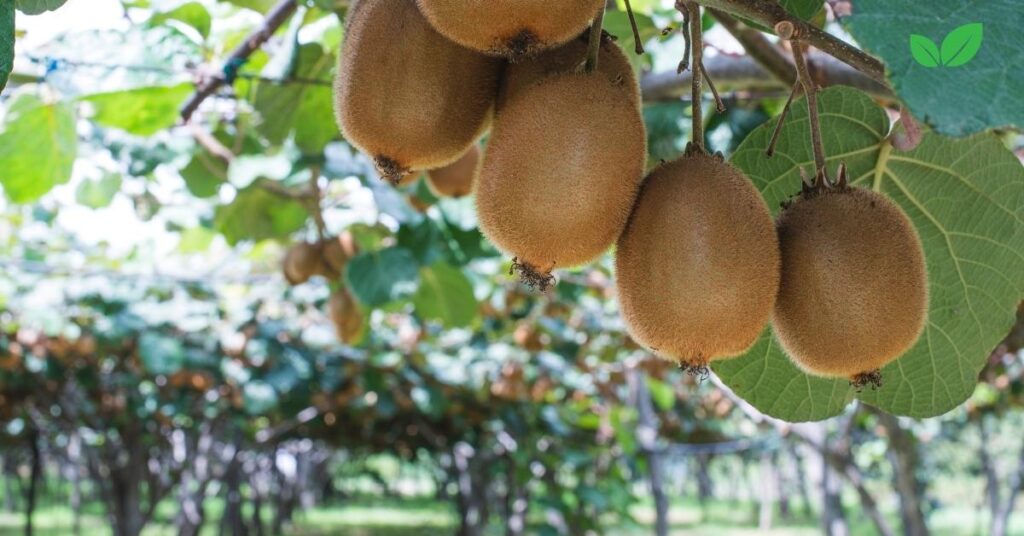
Pest and Disease Management
Golden kiwi production faces challenges from pests and diseases that can impact yield and fruit quality. Managing these threats requires careful monitoring and the use of sustainable practices.
- Fungal Diseases: Fungal infections, such as root rot and leaf spot, can damage kiwi vines, especially in humid conditions. Regular pruning and the use of organic fungicides help reduce the spread of fungal spores.
- Insect Pests: Insects like scale insects and vine borers can damage kiwi vines and reduce fruit production. Integrated Pest Management (IPM) strategies, which include the use of beneficial insects, can effectively control these pests.
Climate Change Impacts
Climate change poses a significant threat to the long-term sustainability of golden kiwi production. Changes in temperature, precipitation patterns, and the increased frequency of extreme weather events can affect the growth and productivity of kiwi vines.
- Temperature Variability: Extreme temperatures, whether too hot or too cold, can stress kiwi plants and reduce their ability to produce fruit. Frost during the growing season can damage young shoots, while heatwaves can lead to sunburned fruit.
- Water Scarcity: In regions where water availability is becoming more unpredictable, maintaining adequate irrigation levels for kiwi production is a challenge. Water-efficient practices and drought-resistant rootstocks are being explored to address this issue.
The Future of Golden Kiwi in Sustainable Agriculture
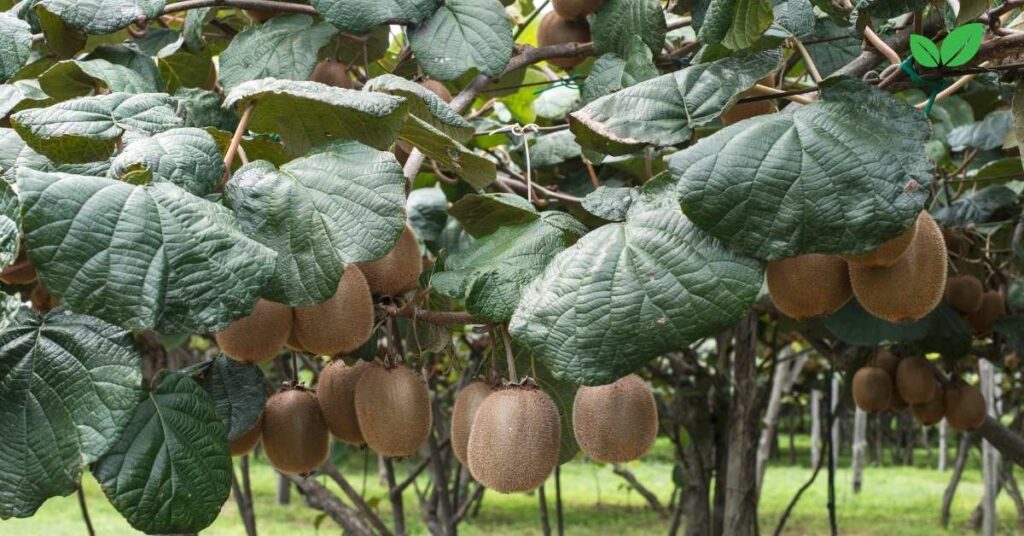
Research and Innovation
Continued research and innovation in kiwi cultivation techniques are essential for enhancing the sustainability and resilience of the industry.
- Breeding for Resilience: Plant breeders are working to develop new varieties of golden kiwi that are more resistant to pests, diseases, and climate variability. These resilient varieties can help ensure consistent yields even in changing environmental conditions.
- Precision Agriculture: The adoption of precision agriculture technologies, such as drone mapping and automated irrigation systems, allows farmers to optimize resource use and improve the efficiency of their operations. This technology can help reduce the environmental footprint of kiwi production.
Consumer Awareness and Demand for Sustainability
Consumer awareness about the environmental impact of food production is driving demand for sustainably grown produce, including golden kiwi.
- Eco-Friendly Certifications: Certifications such as organic, Fair Trade, and Rainforest Alliance are becoming more important in the marketplace. These certifications ensure that the fruit is grown in a way that respects environmental and social standards.
- Support for Local and Sustainable Farming: By choosing sustainably grown golden kiwi, consumers can support farming practices that prioritize soil health, water conservation, and biodiversity. This shift in consumer preference is encouraging more farmers to adopt sustainable methods.
Conclusion: The Role of Golden Kiwi in a Sustainable Future
Golden kiwi, with its sweet taste and rich nutritional profile, is more than just a delicious fruit; it represents the potential for sustainable agriculture practices. From its role in promoting biodiversity and supporting pollinators to its economic benefits for rural communities, the cultivation of golden kiwi can contribute to a healthier environment and a more resilient agricultural system.
By adopting sustainable practices such as organic farming, water conservation, and agroforestry, the golden kiwi industry can continue to thrive while minimizing its ecological footprint. As climate change challenges the agricultural sector, innovative solutions and consumer support for sustainable produce will play a crucial role in ensuring the long-term viability of golden kiwi production. This approach not only benefits the environment but also ensures that future generations can continue to enjoy this golden treasure from nature.
Read More: Dew Melon: The Green Marvel Fueling Sustainable Health and Wellness

